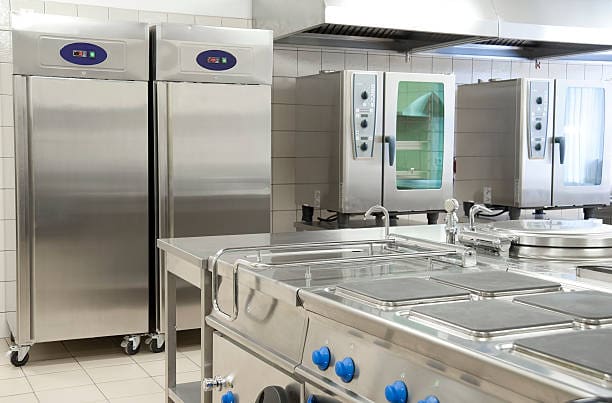Running a successful catering business means having the right tools to create seamless operations, maintain food quality, and meet customer expectations. Whether you’re starting out or upgrading your current kitchen, investing in commercial catering equipment tailored to your needs can make all the difference.
In this blog, we’ll guide you through the process of selecting the right equipment, discussing essential types, factors to consider, and tips to get the best value for your investment.

The Importance of Choosing the Right Commercial Catering Equipment
High-quality commercial catering equipment is designed to handle the demands of a busy kitchen, ensuring reliability, efficiency, and compliance with health standards. Selecting the right equipment impacts your operations in several ways:
- Improved Efficiency: Industrial-grade tools speed up preparation, cooking, and cleaning tasks.
- Durability: Commercial appliances are built to withstand heavy use, saving money on frequent replacements.
- Customer Satisfaction: Proper equipment ensures timely service and consistently high-quality food.
- Health Compliance: Equipment designed for commercial use meets safety regulations for food storage and preparation.
Essential Types of Commercial Catering Equipment
Every catering business has unique needs, but there are key categories of equipment that most kitchens require:
1. Cooking Equipment
Efficient cooking appliances form the backbone of any kitchen. Key items include:
- Ovens: From convection ovens to combi ovens, these are ideal for baking, roasting, and steaming.
- Ranges and Hobs: Gas or electric ranges offer versatility for cooking multiple dishes at once.
- Grills and Fryers: Perfect for high-demand menu items like fried chicken, burgers, or grilled vegetables.
2. Refrigeration Equipment
Reliable refrigeration keeps ingredients fresh and minimizes waste. Options include:
- Upright Fridges: Ideal for kitchens with limited space but high storage demands.
- Freezers: Chest and upright freezers for bulk storage of frozen goods.
- Display Fridges: Great for showcasing beverages, desserts, or ready-to-eat items to customers.
3. Food Preparation Tools
Streamline food prep with essential tools like:
- Mixers: Perfect for bakeries or kitchens handling large volumes of dough.
- Food Processors: Simplify slicing, chopping, and blending tasks.
- Blenders: Ideal for sauces, soups, or beverages.
4. Warewashing Equipment
Hygiene is a top priority in the catering industry. Essential cleaning tools include:
- Dishwashers: Designed to handle high volumes of crockery efficiently.
- Glasswashers: Ensure streak-free glasses for bars or restaurants.
- Sinks: Stainless steel sinks for manual washing or quick rinsing.
5. Storage Solutions
Keeping your kitchen organized boosts productivity and reduces waste. Consider:
- Shelving: Stainless steel shelving for dry goods and utensils.
- Containers: Airtight food storage containers to extend shelf life.
- Racks and Carts: Mobile solutions for transporting and storing items.
Factors to Consider When Buying Commercial Catering Equipment
Choosing the right equipment requires a balance of practicality, quality, and cost-effectiveness. Here are the key factors to keep in mind:
1. Your Menu and Workflow
Understand your menu and kitchen operations before investing. For example, if your business focuses on baked goods, a high-capacity oven and planetary mixer will be essential. Match your purchases to your most-used processes.
2. Energy Efficiency
Energy-efficient equipment reduces operating costs and supports sustainability. Look for models with high energy ratings or certifications like ENERGY STAR®.
3. Durability and Materials
Invest in equipment made from high-quality materials like stainless steel. These are easier to clean, more durable, and less prone to wear and tear.
4. Available Space
Measure your kitchen to ensure equipment fits comfortably and doesn’t obstruct workflow. Compact options like under-counter fridges can save space while maintaining functionality.
5. Cost and Budget
Set a clear budget and explore both new and used equipment options. Used equipment can offer great value if purchased from reputable suppliers who provide maintenance records and warranties.
6. Warranty and Support
Check for warranties or after-sales support to protect your investment. Reputable suppliers often offer extended warranties on new and refurbished equipment.
Tips for Buying Commercial Catering Equipment
Getting the best value for your investment requires planning and research. Follow these tips for a smooth purchasing experience:
1. Buy from Reputable Dealers
Trusted suppliers often provide refurbished equipment, detailed maintenance records, and warranties. Avoid unverified sellers to reduce the risk of purchasing faulty items.
2. Inspect Before Purchase
When buying used equipment, inspect the condition of key components like:
- Door Seals: Ensure airtight seals for refrigeration.
- Moving Parts: Check for wear and tear on mechanical components like mixers or fryers.
- Hygiene Standards: Confirm cleanliness and proper refurbishing.
3. Prioritize Multi-Functional Equipment
Multi-functional appliances, like combination ovens or food processors with multiple attachments, maximize utility and save space.
4. Consider Financing Options
Many suppliers offer financing plans, allowing you to acquire high-quality equipment without large upfront costs. Explore lease-to-own options for greater flexibility.
5. Plan for Maintenance
Schedule regular maintenance to keep your equipment running efficiently. Cleaning and servicing prevent costly breakdowns and extend the lifespan of your tools.
Why Used Commercial Catering Equipment Can Be a Great Option
For businesses on a budget, buying used commercial catering equipment is a smart alternative. Here’s why:
- Cost Savings: Used equipment is significantly cheaper than new, freeing up funds for other priorities.
- Availability: Many used items are available for immediate purchase, avoiding long lead times.
- Refurbished Quality: Reputable dealers often refurbish used equipment to meet high standards.
Pro Tip: Always verify the equipment’s history and condition when buying used to ensure reliability.
Final Thoughts
Selecting the right commercial catering equipment is a critical step in running an efficient and successful business. By understanding your needs, researching your options, and prioritizing quality and functionality, you can build a kitchen that meets both your operational and financial goals.
Whether you’re purchasing new or used equipment, focus on durability, energy efficiency, and space-saving designs. With the right tools in place, your catering business can operate smoothly, deliver exceptional results, and grow sustainably over time.

